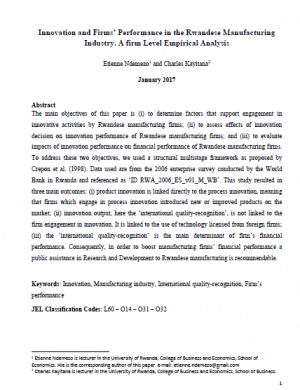The African Policy Dialogue on entrepreneurship development in Rwanda has published a research paper which looks at the relationship between innovation and firms’ performance in Rwandese manufacturing industry. The main objectives of this paper are to (i) determine factors that support engagement in innovative activities by Rwandese manufacturing firms; (ii) assess effects of innovation decision on innovation performance of Rwandese manufacturing firms; and to (iii) evaluate impacts of innovation performance on financial performance of Rwandese manufacturing firms.
Key messages
- Product innovation is linked directly to the process innovation, meaning that firms which engage in process innovation have introduced new or improved products on the market.
- Innovation output or the ‘international quality-recognition’, is not linked to the firm engagement in innovation. It is linked to the use of technology licensed from foreign firms.
- The ‘international quality-recognition’ is the main determinant of firm’s financial performance.
Recommendations
- Develop strategies for public assistance in research and development to private manufacturing firms in order to boost their innovativeness.
- It is advisable that manufacturing firms apply for an ‘international quality-recognition’, because it is important for their financial sustainability.











